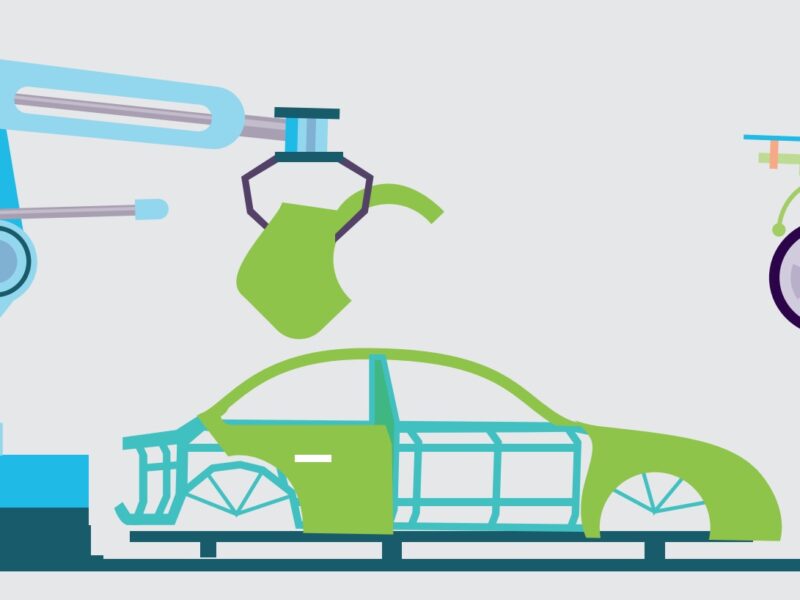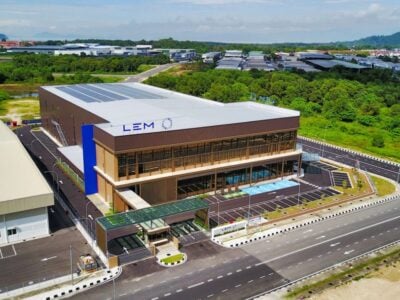
Automotive industry to massively expand investments in smart factories
The study examines where automobile manufacturers (OEMs) and suppliers stand today when it comes to the topic of smart factories and compares the results with studies from the years 2017/18. It shows that both the predicted investment levels and productivity increases associated with smart factories are considerable.
“Smart” factories are characterized by the fact that they use digital technologies to achieve improvements in productivity, quality, flexibility and service. Three key technologies make the intelligent factory possible: connectivity, e.g. the use of industrial IoT to collect data; intelligent automation, e.g. advanced robotics, industrial image processing, distributed control or drones; and predictive analytics based on AI These digital technologies also enable IT-OT convergence to support digital continuity from design to operation (digital twin).
According to the study, only a small proportion of automotive companies are currently able to fully exploit the advantages of the smart factory. The study classifies 72% of the companies in the automotive value chain as “beginners”, while only 10% are “pioneers” and thus equipped to exploit the full potential of intelligent factories. There is a certain gap between the OEMs and suppliers: Among OEMs, 18 % are among the pioneers, among suppliers only 8 %.
The most important results of the study at a glance:
In the last two years, 30% of the factories have been converted into smart ones. This pace exceeded the expectations of 2017/18, because two years ago the managers surveyed still assumed a 24% share.
The automotive industry has set itself ambitious targets for the next five years and plans to convert 44% of its factories into smart plants. This puts it in a leading position worldwide compared with other industries. In the discrete manufacturing sector (excluding the automotive industry), for example, the share of intelligent factories is to be increased by 42% by 2025, followed by the process industry with 41%, the energy and utilities sector with 40% and the consumer goods industry with 37%.
The investment plans of automotive companies are also reflected in the proportion of total sales that they plan to invest in smart factories each year: This is expected to rise from around 2.2% over the last three years to 3.5% by 2023 – an increase of 62%. Automotive companies will focus their investments on a combination of “greenfield” and “brownfield” facilities: 44% are planning a hybrid approach, 31% are considering building brownfield factories (estimated cost for one of the ten largest OEMs: $4 to $7.4 million per facility), and 25% want to invest in a greenfield factory (cost of $1 to $1.3 billion per factory – this sounds more expensive at first, but allows for an efficiency-oriented setup right from the start). The term greenfield stands for the installation of digital technology in a completely new environment, brownfield means the gradual replacement of conventional technology and equipment with digital.
The study extrapolated the productivity growth through intelligent factories until 2023: Even in a conservative scenario, it was $104 billion. Companies like Mercedes-Benz Cars are already exploiting the potential: By using Advanced Data Analytics to create self-learning and self-optimizing production systems, the automaker was able to achieve a fourfold reduction in the reject rate for some key components.
“Since smart factories are a crucial part of Industry 4.0, OEMs and suppliers must also focus on smart operations, “commented Henrik Ljungström, Head of the Automotive Sector at Capgemini in Germany. “This includes making asset management, supply chain and service management ‘smart’ in order to fully exploit the potential of the various technologies.
However, there is still a long way to go before the automotive industry can fully exploit the potential of intelligent factories: For example, the goal of increasing productivity by 35% has so far only been achieved in 15% of cases.
For the study, 100 managers of major automotive manufacturers and suppliers from eleven countries with sales of more than 1 billion US dollars were surveyed, 98 of whom already operate intelligent factories.
The study (in German language) can be found at www.capgemini.com/de .
Related articles:
Storage should not be an afterthought in industrial design
Software enables demand-oriented optimization for Industry 4.0
Integrating legacy CNC machines into a smart factory
Toyota reveals plans for ‘living lab’ smart city of the future
 If you enjoyed this article, you will like the following ones: don't miss them by subscribing to :
eeNews on Google News
If you enjoyed this article, you will like the following ones: don't miss them by subscribing to :
eeNews on Google News




